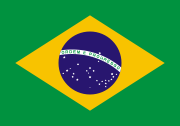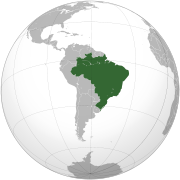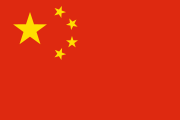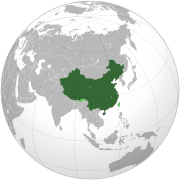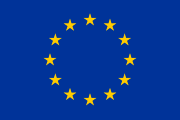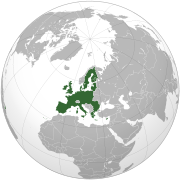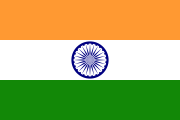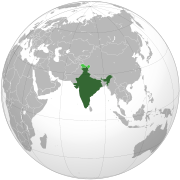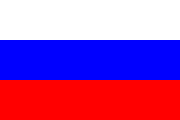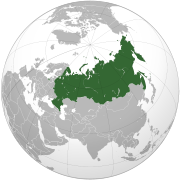- Potential superpowers
-
 The present-day governments that have been claimed to become (or to remain) superpowers during the 21st century.
The present-day governments that have been claimed to become (or to remain) superpowers during the 21st century.
The list of governments.A potential superpower is a state or a political and economic entity that is speculated to be, or to be in the process of becoming, a superpower at some point in the 21st century. Previously, it was considered by many sources that only the United States fulfilled the criteria to be considered a superpower.[3][4] However, this view is now challenged by some who believe the rise of China (a state) and the European Union (a supranational entity) have already supplanted the sole superpower status of the United States.[5][6][7][8][9] The states of India, Russia,[10][11] and Brazil[12][13][14] are also regarded as potential superpowers of the future. Collectively, these four states, the European Union and the United States comprise 66.6% of global nominal GDP, 62.2% of global GDP (PPP) and more than 50% of the world's population.
Predictions made in the past have not been perfect. For example, in the 1980s, many political and economic analysts predicted that Japan would eventually accede to superpower status, due to its large population, huge gross domestic product and high economic growth at that time.[15][16] Though still the world's third-largest economy as of 2011, Japan has faced an ongoing period of weak growth since the "lost decade" of the 1990s, eroding its potential as a superpower.
Contents
Brazil
Federative Republic of Brazil The Federative Republic of Brazil is considered by a number of analysts and academics a potential superpower of the 21st century.[12][13][14]
In a lecture entitled Brazil as an Emerging World Power,[17] presented at the Mario Einaudi Center for International Studies at Cornell University, Leslie Elliot Armijo has said that "Brazil will soon rise as Latin America’s first superpower". Armijo states that "Brazil keeps solidifying itself as leader of its region by launching a series of integration projects", adding also that "as an international actor, Brazil has also taken a larger share of world politics by incrementing its already strong presence in economic initiatives, such as the International Finance Facility and the G20", asserting that "Brazil’s rising prominence derives from its solid democratic rule and its strong economy" and concluding that "Soon, we’ll have two superpowers in the Western Hemisphere".[12][18]
Elizabeth Reavey, a research associate from the Council on Hemispheric Affairs, claims in the title of her article that While the US Looks Eastward Brazil Is Emerging as a Nuclear Superpower.[13] Describing the importance of the ongoing development of nuclear technology in the country, she calls Brazil an emerging superpower, with a "potential to have a China-like, booming economy, increased nuclear capabilities, a growing self-confidence in its own power and an ability to make its own way".
Brazil is often called an economic superpower,[19][20] either present[21] or future, and many experts and journalists compare Brazil with the other potential superpowers of the BRIC group. Jonathan Power from Transnational Foundation for Peace and Future Research claims in his article Brazil is Becoming an Economic and Political Superpower that "Brazil has a head start on India and China", saying that it has been positively developing for over 100 years, and adding that "between 1960 and 1980 Brazil doubled its per capita income".[14] Power also speculates that Brazil "has a good chance of emerging as the world’s first economic superpower without nuclear weapons".
There are, however, numerous obstacles to Brazil reaching superpower status. According to Nobel Prize-winning economist Paul Krugman, recognising Brazil's current economic strength is “not the same as [saying] it will become the economic superpower [anytime soon].”[22] Similarly, energy analyst Mark Burger writes that Brazil, in general, will improve its energy situation, but not to the point of being an energy superpower.[23]
China
See also: Chinese CenturyPeople's Republic of China The People's Republic of China receives continual coverage in the popular press of its potential superpower status,[24] and has been identified as a rising or emerging economic and military superpower by academics and other experts. In fact, the 'rise of China' has been named the top news story of the 21st century by the Global Language Monitor, as measured by number of appearances in the global print and electronic media, on the Internet and blogosphere, and in Social Media. [25][26][27][28][29]
Barry Buzan asserts that "China certainly presents the most promising all-round profile" of a potential superpower.[30] Buzan claims that "China is currently the most fashionable potential superpower and the one whose degree of alienation from the dominant international society makes it the most obvious political challenger." However, he notes this challenge is constrained by the major challenges of development and by the fact that its rise could trigger a counter coalition of states in Asia.
Parag Khanna states that by making massive trade and investment deals with Latin America and Africa, China has established its presence as a superpower along with the European Union and the United States. China's rise is demonstrated by its ballooning share of trade in its gross domestic product. He believes that China's "consultative style" has allowed it to develop political and economic ties with many countries including those viewed as rogue states by the United States. He states that the Shanghai Cooperation Organization founded with Russia and the Central Asian countries may eventually be the "NATO of the East".[31]
Geoffrey Murphay's China: The Next Superpower argues that while the potential for China is high, this is fairly perceived only by looking at the risks and obstacles China faces in managing its population and resources. The political situation in China may become too fragile to survive into superpower status according to Susan Shirk in China: Fragile Superpower.[32] Other factors that could constrain China's ability to become a superpower in the future include: limited supplies of energy and raw materials, questions over its innovation capability, inequality and corruption, and risks to social stability and the environment. Minxin Pei does not believe that China is a superpower or that it will be one anytime soon arguing that it faces daunting political and economic challenges.[33] Amy Chua states that whether a country has enough pull to bring immigrants is an important quality for a superpower. She also writes that China lacks the pull to bring scientists, thinkers, and innovators from other countries as immigrants. However, she believes that China made up for this with its own diaspora, saying that size and resources for them are unparalleled.[34]
European Union
European Union The European Union (EU) has been called an emerging superpower by academics.[9][35] Many scholars and academics like T.R. Reid,[36] Andrew Reding,[37] Andrew Moravcsik,[38] Mark Leonard,[39] Jeremy Rifkin,[40] John McCormick,[41] and some politicians like Romano Prodi[42] and Tony Blair[43][44] either believe that the EU is, or will become, a superpower in the 21st century.
Mark Leonard cites several factors: the EU's large population, large economy (the EU has the largest economy in the world; the economy of the EU is slightly larger than that of the U.S. in terms of GDP purchasing (PPP) [45]), low inflation rates, the unpopularity and perceived failure of US foreign policy in recent years, and certain EU members states' high quality of life (when measured in terms such as hours worked per week, health care, social services).[46]
John McCormick believes that the EU has already achieved superpower status, based on the size and global reach of its economy and on its global political influence. He argues that the nature of power has changed since the Cold War-driven definition of superpower was developed, and that military power is no longer essential to great power; he argues that control of the means of production is more important than control of the means of destruction, and contrasts the threatening hard power of the United States with the opportunities offered by the soft power wielded by the European Union.[47]
Parag Khanna believes that the EU, together with China, has already achieved superpower status and rivals the US for influence around the world.[48][49] He also mentions the large economy of the EU, that European technologies more and more set the global standards and that European countries give the most development assistance. He agrees with McCormick that the EU does not need a common army to be a superpower. The EU uses intelligence and the police to apprehend radical Islamists, social policy to try to integrate restive Muslim populations and economic strength to incorporate the former Soviet Union and gradually subdue Russia.[48] Khanna also writes that South America, East Asia, and other regions prefer to emulate the "European Dream" than the American variant.[50] This could possibly be seen in the South American Union and the African Union. Notably, the EU as a whole is among the most culturally diverse "entities" on the planet,[51] with some of the world's largest and most influential languages being official within its borders.[52]
Andrew Reding also takes the future EU enlargement into account. An eventual future accession of the rest of Europe, the whole of Russia, and Turkey, would not only boost the economy of the EU, but it would also increase the EU's population to about 800 million, which he considers almost equal to that of India or China. The EU is qualitatively different from India and China since it is enormously more prosperous and technologically advanced.[37] Turkish PM Recep Tayyip Erdoğan said in 2005: "In 10 or 15 years, the EU will be a place where civilizations meet. It will be a superpower with the inclusion of Turkey." [53]
Robert J. Guttman wrote in 2001 that the very definition of the term superpower has changed and in the 21st century, it does not only refer to states with military power, but also to groups such as the European Union, with strong market economics, young, highly educated workers savvy in high technology, and a global vision.[54] Friis Arne Petersen, the Danish ambassador to the U.S. has expressed similar views. He conceded that the EU is a “special kind of superpower,” one that has yet to establish a unified military force that exerts itself even close to the same level as many of its individual members.[55]
Additionally, it is argued by commentators that full political integration is not required for the European Union to wield international influence: that its apparent weaknesses constitute its real strengths (as of its low profile diplomacy and the emphasis on the rule of law)[47] and that the EU represents a new and potentially more successful type of international actor than traditional ones;[56] however, it is uncertain if the effectiveness of such an influence would be equal to that of a politically integrated superpower such as the United States.[57]
Barry Buzan notes that the EU's potential superpower status depends on its "stateness". It is unclear though how much state-like quality is needed for the EU to be described as a superpower. Buzan states that the EU is likely to remain a potential superpower for a long time because although it has material wealth, its "political weakness and its erratic and difficult course of internal political development, particularly as regards a common foreign and defence policy" constrains it from being a superpower.[30]
Alexander Stubb, the Finnish Minister for Foreign Affairs, has said that he thinks the EU is both a superpower and not a superpower. While the EU is a superpower in the sense that it is the largest political union, single market and aid donor in the world, it is not a superpower in the defense or foreign policy spheres. Like Barry Buzan, Alexander Stubb thinks that the most major factor constraining the EU’s rise to superpower status is its lack of statehood in the international system, other factors are its lack of internal drive to project power worldwide, and continued preference for the sovereign nation-state amongst some Europeans. To counter-balance these he urged the EU leaders to approve and ratify the Lisbon Treaty (which they did in 2009), create an EU foreign ministry (EEAS, led by High Representative Catherine Ashton, will be finished in 2012), develop a common EU defense, hold one collective seat at the UN Security Council and G8, and address what he described as the “sour mood” toward the EU prevalent in some European countries today.[58]
However, some do not believe that the EU will achieve superpower status. "The EU is not and never will be a superpower" according to the former UK Secretary of State for Foreign and Commonwealth Affairs David Miliband.[59] Lacking a unified foreign policy and with an inability to project military power worldwide, the EU lacks "the substance of superpowers," who by definition have "first of all military reach [and] possess the capacity to arrive quickly anywhere with troops that can impose their government's will.".[60] EU parliamentarian Ilka Schroeder argues that conflicts such as the Israeli-Palestinian dispute see close EU involvement largely to compensate for European inability to project military power internationally.[61]
The Economist's Robert Lane Greene notes that the lack of a strong European military only exacerbates the lack of unified EU foreign policy and discounts any EU arguments towards superpower status, noting especially that the EU's creation of a global response force rivaling the superpower's (America) is "unthinkable."[62] The biggest barrier to European superpowerdom is that European elites refuse to bring their postmodern fantasies about the illegitimacy of military "hard power" into line with the way the rest of the world interprets reality" according to Soren Kern of Strategic Studies Group.[63] Britain's Michael Howard has warned against the "worry" that many Europeans are pushing for greater EU integration to counter-balance the United States,[64] while Europe's total reliance on soft (non-military) power is in part because of its lack of a "shared identity." [65] While to some the European Union should be a "model power" unafraid of using military force and backing free trade, its military shortcomings argue against superpower status.[66]
India
Republic of India Several media publications and academics have discussed the Republic of India's potential of becoming a great power or eventually a superpower.[67][68] However, Daniel Lak describes India as the underdog, facing more challenges than advantages, yet it is approaching superpower status. He also mentions that despite the hardships of significant poverty and social inequality, India is overcoming all of this.[69]
Anil Gupta is almost certain that India will become a superpower in the 21st century. As an example, he states that due to India's functional institutions of democracy and its relatively corruption-free society, it will emerge as a desirable, entrepreneurial and resource and energy-efficient superpower in the near future. He predicts that by 2015 India will overtake China to be the fastest growing economy in the world and emerge as a full-fledged economic superpower by 2025. In addition to that, he states, India has the potential to serve as a leading example of how to combine rapid economic growth with fairness towards and inclusion of those at the bottom rungs of the ladder and of efficient resource utilization, especially in energy. [70]
Robyn Meredith claims that both India and China will be superpowers. However, she points out that China is decades ahead of India, and that the average Chinese person is better off than the average Indian person.[71] Amy Chua also adds to this, stating that while India's potential for superpower is great, it still faces many problems such as "pervasive rural poverty, entrenched corruption, and high inequality just to name a few". Also like China, India lacks the "pull" for immigrants, and Indians still continue to emigrate in large numbers. However, she notes that India has made tremendous strides to fix this, stating that some of India's achievements, such as working to dismantle the centuries-old caste system and maintaining the world's largest diverse democracy is historically unprecedented.[34]
Parag Khanna believes that India is not, and will not become a superpower for the foreseeable future, lagging decades behind China in both development and strategic appetite.[72] Instead, he believes India will be a key swing state along with Russia.[73] He says that India is "big but not important", has a highly successful professional class, while millions of its citizens still live in extreme poverty. He also writes that it matters that China borders a dozen more countries than India and is not hemmed in by a vast ocean and the world's tallest mountains. China has a loyal diaspora twice the size of India's and enjoys a head start in Asian and African marketplaces.[74] However in a recent article written by Parag Khanna, he says that India, along with China will grow ever stronger, while other powers, like Europe, muddles along[75].
Russia
Russian Federation The Russian Federation has been suggested by some as a potential candidate for resuming superpower status in the 21st century.[10][11]
According to economist Steven Rosefielde of the University of North Carolina, Chapel Hill, Russia intends to "reemerge as a full-fledged superpower," and "contrary to conventional wisdom, this goal is easily within the Kremlin's grasp, but the cost to the Russian people and global security would be immense."[76] Rosefielde further argues that Russia "has an intact military-industrial complex...and the mineral wealth to reactivate its dormant structurally militarized potential," and that "supply-side constraints don't preclude a return to prodigal superpowerdom".[76][77]
Military analyst Alexander Golts of The St. Petersburg Times argues that Putin's confrontations with the U.S. on nuclear issues are in pursuit of regaining superpower status for Russia.[78] It has been argued that Russia's foreign policy toward bordering countries is designed with the ultimate goal of regaining superpower status.[79] Mike Ritchie of industry analysts Energy Intelligence says "Russia was always a superpower that used its energy to win friends and influence among its former Soviet satellites. Nothing has really changed much. They are back in the same game, winning friends and influencing people and using their power to do so."[80]
See also
References
- ^ Country profile: United States of America, BBC News, Accessed July 22, 2008
- ^ "Analyzing American Power in the Post-Cold War Era". http://post.queensu.ca/~nossalk/papers/hyperpower.htm. Retrieved 2007-02-28.
- ^ "The Lonely Superpower". Huntington, Samuel P.. 1999. http://homepages.stmartin.edu/Fac_Staff/rlangill/PLS%20300/The%20Lonely%20Superpower.htm. Retrieved 2010-08-04.
- ^ "Lonely Superpower or Unapologetic Hyperpower?, Analyzing American Power in the Post-Cold War Era". Kim Richard Nossal. 1999. http://post.queensu.ca/~nossalk/papers/hyperpower.htm. Retrieved 2010-08-04.
- ^ Jacques, Martin (2006-06-15). "This is the relationship that will define global politics". The Guardian (London). http://www.guardian.co.uk/commentisfree/2006/jun/15/comment.china. Retrieved 2010-05-22.
- ^ "China: a force fit for a superpower". The Telegraph. 2011. http://www.telegraph.co.uk/news/worldnews/asia/china/8251307/China-a-force-fit-for-a-superpower.html.
- ^ "China Seen Overtaking US As Global Superpower". Pew Research Center. 2011. http://www.pewglobal.org/2011/07/13/china-seen-overtaking-us-as-global-superpower/.
- ^ "Quickly, quietly, the EU gains superpower status". Oxford Press. 2005. http://www.oxfordpress.com/hp/content/shared/news/world/stories/05/08_EUROPE_SUPERPOWER.html.
- ^ a b Guttman, R.J. (2001) Europe in the New Century Lynne Rienner Publishers
- ^ a b Rosefielde, S (2004) Russia in the 21st Century, Cambridge University Press
- ^ a b New York Times by Ronald Steel professor of international relations August 24, 2008 (Superpower Reborn)[1]
- ^ a b c http://cornellsun.com/section/news/content/2009/11/01/alumna-analyzes-brazil%E2%80%99s-emergence
- ^ a b c While the US Looks Eastward Brazil Is Emerging as a Nuclear Superpower
- ^ a b c Brazil is becoming an economic and political superpower
- ^ Japan From Superrich To Superpower, TIME 4 July 1988
- ^ Zakaria, F (2008) The Post-American World, “W. W. Norton and Company” ISBN 9780393062359 p. 210
- ^ Brazil as an Emerging World Power
- ^ http://www.mre.gov.br/portugues/noticiario/nacional/selecao_detalhe3.asp?ID_RESENHA=634888
- ^ Brookings Institution Press: Brazil as an Economic Superpower?
- ^ "An economic superpower, and now oil too". The Economist. 2008-04-17. http://www.economist.com/opinion/displaystory.cfm?story_id=11052873.
- ^ http://www.economist.com/opinion/displaystory.cfm?story_id=11052873 Brazil, an economic superpower, and now oil too
- ^ [2]
- ^ [3]
- ^ Visions of China, CNN Specials, Accessed March 11, 2007
- ^ The Rise of China Ranked in the First Place of 21st Century News
- ^ Does China Want to Be Top Superpower?
- ^ www.carnegieendowment.org
- ^ www.getabstract.com
- ^ www.au.af.mil
- ^ a b Buzan, Barry (2004). The United States and the Great Powers. Cambridge, United Kingdom: Polity Press. pp. 70. ISBN 0745633757.
- ^ Waving Goodbye to Hegemony (PARAG KHANNA)
- ^ Shirk, S (2008) China:Fragile Superpower, "Oxford University Press, USA ISBN 9780195373196
- ^ http://apac2020.the-diplomat.com/feature/china%E2%80%99s-not-a-superpower/
- ^ a b Chua, A (2007) Day of Empire: How Hyperpowers Rise to Global Dominance -- and why They Fall, "Random House" ISBN 9780385512848
- ^ Wilson Center The EU Future: Global Power or European Governance?, Wilson Center
- ^ Reid, T.R. (2004) The United States of Europe 305p, Penguin Books ISBN 1594200335
- ^ a b Reding, A (2002) EU in position to be world’s next superpower, Chicago Tribune{
- ^ [4]
- ^ Mark Leonard, (2006) Why Europe Will Run the 21st Century, Perseus Books Group ISBN 1586484249
- ^ Rifkin, J. (2004) The European Dream ISBN 1-58542-345-9The European Dream ISBN 1-58542-345-9
- ^ The European Superpower
- ^ The Atlantic
- ^ allbusiness
- ^ WORLD POLICY JOURNAL
- ^ https://www.cia.gov/library/publications/the-world-factbook/rankorder/2001rank.html
- ^ Mark Leonard (2005) Europe: the new superpower, Irish Times
- ^ a b John McCormick The European Superpower
- ^ a b Khanna P.Waving Goodbye to Hegemony, New York Times Magazine
- ^ Khanna P. Guess Who's Coming to Power
- ^ Khanna P. The Empire Strikes Back
- ^ http://www.informaworld.com/smpp/section?content=a770439041&fulltext=713240928
- ^ http://www.nocturne.ca/nn-worldlanguages.htm
- ^ Journal of Turkish Weekly
- ^ Europe in the New Century: Visions of an Emerging Superpower
- ^ http://stories.globalatlanta.com/2008stories/016337.html
- ^ Hyde-Price A (2004) The EU, Power and Coercion: From 'Civilian' to 'Civilising' Power Arena
- ^ http://www.nybooks.com/articles/17726
- ^ [5]
- ^ http://www.gees.org/documentos/Documen-02639.pdf
- ^ http://fr.jpost.com/servlet/Satellite?pagename=JPost/JPArticle/ShowFull&cid=1226404727902
- ^ http://www.crosswalk.com/1238927/
- ^ http://www.globalpolicy.org/component/content/article/173-sovereign/30500.html
- ^ http://www.isn.ch/isn/Communities-and-Partners/Partners/Detail/?lng=en&id=51949
- ^ "Howard warning on EU 'superpower'". BBC News. 2004-11-17. http://news.bbc.co.uk/1/hi/uk_politics/4020973.stm. Retrieved 2010-05-22.
- ^ http://uscpublicdiplomacy.com/index.php/newsroom/specialreports_detail/the_european_union_a_quiet_superpower_or_a_relic_of_the_past/
- ^ "Britain sees EU as 'model power' not 'superpower'". Daily Mail (London). 2007-11-15. http://www.dailymail.co.uk/news/article-494313/Britain-sees-EU-model-power-superpower.html.
- ^ India Rising | Newsweek International | Newsweek.com
- ^ India welcomed as new sort of superpower, IHT, Accessed March 11, 2007
- ^ Lak, D (2008) India Express: The Future of the New Superpower, "Palgrave Macmillan" ISBN 9780230607835
- ^ India 2025: What kind of superpower?
- ^ Meredith, R (2008) The Elephant and the Dragon: The Rise of India and China and What it Means for All of Us, "W.W Norton and Company" ISBN 9780393331936
- ^ Waving Goodbye to Hegemony
- ^ Khanna, P (2008) The Second World: Empires and Influence in the New Global Order, “Random House” ISBN 978140065080
- ^ The Rise of Non-Americanism
- ^ [6]
- ^ a b Rosefielde, Steven (2004). Russia in the 21st Century: The Prodigal Superpower. New York: Cambridge University Press. pp. 1–9. ISBN 978-0521545297.
- ^ Cambridge.org University of North Carolina Dec. 2004 by Steven Rosefielde “Russia in the 21st Century The Prodigal Superpower”[7]
- ^ St. Petersburg Times: "Dreaming of New Conflicts"
- ^ Rywkin, Michael (January 2008). "Russia: In Quest of Superpower Status". American Foreign Policy Interests 30 (1): 13–21. doi:10.1080/10803920701854272. http://www.informaworld.com/smpp/content~db=all~content=a790546758. Retrieved 2009-09-17.
- ^ Russia: A superpower rises again[December 13, 2006]
External Links
Power in international relations Types of power Economic power · Energy superpower · Food power · Hard power · National power · Political power (Machtpolitik · Realpolitik) · Smart power · Soft powerTypes of power status Small powers · Middle power · Regional power · Great power · Superpower (Potential superpowers) · HyperpowerGeopolitics Theory and history Balance of power (European balance of power) · Historical powers · Philosophy of power · Polarity · Power projection · Power transition theory · Second Superpower · Sphere of influence · Superpower collapse · Superpower disengagementStudies Organizations
and groupsAfrican Union · ANZUS · APEC · Arab League · ASEAN · BRICS · CIS · Commonwealth of Nations · CSTO · European Union · G7 · G8 · G8+5 · G20 · G77 · GCC · IBSA · MSG · Mercosur · N-11 · NATO · Non-Aligned Movement · OAS · OECD · SAARC · SCO · Union for the Mediterranean · Union of South American Nations · United NationsCategories:- Futurology
- 21st century
- States by power status
- Superpowers
- Military terminology
Wikimedia Foundation. 2010.

